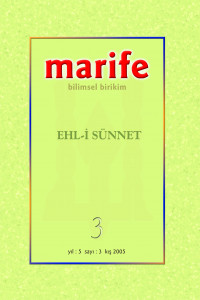Öz
Kalam is a science that determines the convictional construction of the religion con- sidering the content/subject and the method. In particular, following the life and its change, Kalam evaluates the effect of every new arising attitude on the individual and the community and its reflection on the convictional conduct according to the sources and general principles of the religion. In this study, we examine the interaction between Kalam and fact, and that to what extent it is natural, particularly in the examples of Ha- san Basri, Abu Hanifa and Ashari. Thus, we expect that opposing to the claims which are based on the religious arguments, it will be proved that there is a necessary relation between Kalam and factual reality
Öz
Kalam is a science that determines the convictional construction of the religion considering
the content/subject and the method. In particular, following the life and its
change, Kalam evaluates the effect of every new arising attitude on the individual and
the community and its reflection on the convictional conduct according to the sources
and general principles of the religion. In this study, we examine the interaction between
Kalam and fact, and that to what extent it is natural, particularly in the examples of Hasan
Basri, Abu Hanifa and Ashari. Thus, we expect that opposing to the claims which are
based on the religious arguments, it will be proved that there is a necessary relation
between Kalam and factual reality.
Ayrıntılar
| Diğer ID | JA69RY82RT |
|---|---|
| Yazarlar | |
| Yayımlanma Tarihi | 31 Aralık 2005 |
| Yayımlandığı Sayı | Yıl 2005 Cilt: 5 Sayı: 3 |
Bu eser Creative Commons Alıntı-GayriTicari-Türetilemez 4.0 Uluslararası Lisansı ile lisanslanmıştır.

